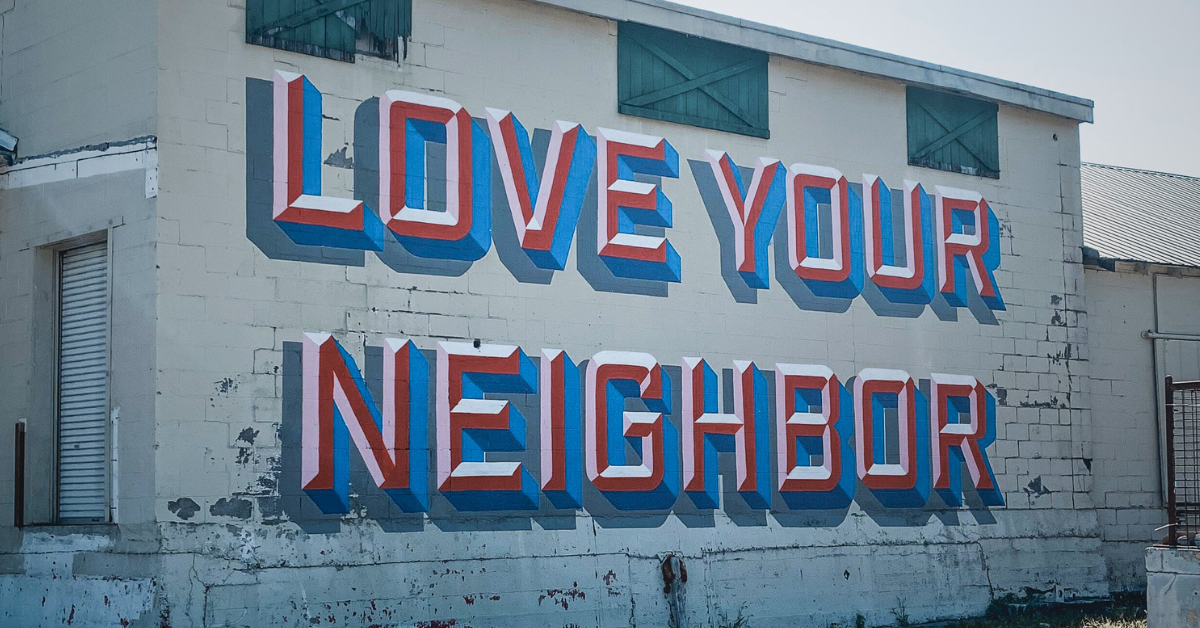“We came from Bethlehem, Georgia bearing Betty Crocker cake mixes into the jungle.”
– The Poisonwood Bible by Barbara Kingsolver
When I was in 5th grade my family went on “home assignment” in St. Bonifacius, Minnesota. That was one of only two full years that I spent in the United States between toddlerhood and my graduation from high school, and while we were there I wrote an odd little story for school called “The Pizza Lady.” It featured the home I’d most recently left behind: Prishtinë, Kosovo. My missionary parents worked alongside a local church there in the early 2000s, in the wake of NATO’s intervention to stop the violence between the country’s Serbian and Albanian populations. In a place riddled with bombed-out buildings, ongoing riots, and constant power outages, I knew one thing for sure: the Serbians were the bad guys. “The Pizza Lady” reflected that belief in the stark terms of a 10-year-old brain.
Most things were black-and-white, good-and-evil back then. My parents, and all Christian missionaries, were obviously the ultimate good guys, serving God and loving their neighbors and taking their faith as seriously as anyone could. I look back at my parents then, as they learned so many languages and loved so many people and did so much good work, with a warm feeling. And my brain has learned to see (and appreciate) the gray.
Third-culture kids
As you may know, a “third-culture kid” (or TCK) is someone raised outside their official passport country without shifting their legal nationality, typically due to their parents’ work—so missionary kids (MKs), “military brats,” diplomats’ children, and other ex-pats. They may have spent their entire childhoods in Nigeria or Japan or Kyrgyzstan (or jumping from one country to the next), but their parents likely continued to describe the occasional summer trip to (in my case) the States as “going back home.” North America may have seemed an alien place during those visits, if only because of the overwhelming number of different Oreo varieties, but whatever culture they were raised in likely also never felt exactly like home. Not being fully “from” either place, TCKs are described as living in a third culture all their own–one defined by adaptability, a sense of placelessness, and a fast-and-deep approach to building friendships. You never knew how long you had before goodbye.
The question, “So where are you from?” was always a tricky one during my first years back in the States for college, thanks to my many moves and lack of a home base. As it turned out, just as Americans have an odd habit of asking “How are you?” without pausing for a real answer, the people who asked where I was from usually just wanted a quick city or state name–not my life story. Having recently left the church, I found myself double-flinching when asked where I grew up. I’d either affirm that my mom now lived in Indiana, or I’d reply vaguely, “overseas,” and then verbally gesture towards unlabeled humanitarian aid efforts if questioned.

Here’s a quick, disjointed, and incomplete mosaic of one missionary kid’s childhood:
- A crowded preschool somewhere in the north of China—enjoying warm soy milk and spicy eggplant for lunch, and telling myself quiet, happy stories under the river of voices I never quite learned to understand.
- A Kosovar garden of tall corn stalks and short pear trees—helping our landlady whack the head off a chicken, whose body proceeded to take a few dizzy, aimless laps while my brothers watched Pokémon in her tea-scented house and the call to prayer echoed from the mosque nearby.
- Walking to the butcher’s shop in Skopje, Macedonia—preparing myself for the jarring sight of skinned, staring goats hanging in the window, smiling at the little Roma girl on her street corner in the dusty heat, and feeling a helpless, preteen twang at my inability to change the world.
- In a quiet town in Germany’s Black Forest—sharing gummy worms with other MKs at our bubble of a boarding school, rolling our eyes at skirt length checks and chore lists and movies made incomprehensible by a sex-and-profanity-filtering DVD player, and sneaking out to the forest at night to whisper about God, boys, and homework.
This post won’t explore any of the strange traumas of being raised on the mission field, though most MKs I know would be willing to admit they experienced one or two. They might mention boarding school experiences, or the aching pain of constantly saying goodbye, or authority figures blaming demons for rebellious phases and mental health struggles, or (for some) the depressing, lived experience of being less important to their parents than the “work of the Lord.” (If you’re interested in unpacking some of this through a fictionalized account, I highly recommend Barbara Kingsolver’s The Poisonwood Bible.) It’s complicated, and every MK’s story is different. We all came out the other end with a different view of how good, bad, or mixed the whole experience was.

What I will say is that, unsurprisingly, the intense world of evangelical missionary work can create long-lasting distortions in a child’s faith, view of the world, and identity. Which is something worth unpacking, dear church leader, if you find yourself with a former MK or two in your congregation. Remind yourself that they grew up in a world that was somehow both so big—rich with the languages and histories and smells of so many homes—and so small—limited to the strange and specific bubble of “the mission field.” This tension resonates for a lifetime.
Loving your neighbor
Most of my young adulthood was spent struggling with very basic and private questions of faith. Now that I’ve finally found my way back to semi-solid ground, though, an old one from my childhood has resurfaced: What does it mean to love your neighbor? My parents moved across the ocean to follow that call, and built every aspect of our lives around it, even when it meant learning yet another language or biting the bullet of boarding school. But could they have done the same thing while living “normal” lives—maybe somewhere in suburban America, with a dog and a minivan and an attic full of memories?
One of the most influential beliefs I absorbed as a missionary kid was that a true Christian life should look incredibly different. Specifically, a Christian life should be one of service. As a kid I figured I would be a teacher, or a counselor, or in ministry, or a social worker, or a nurse, because what was the point of living if you weren’t actively and directly serving someone? Any career path followed for personal financial stability’s sake was a colossal waste.
And of course you would buy second-hand clothes and live frugally and work hard no matter what you did, because the stuff of this world didn’t matter much. You definitely didn’t need a smartphone or a big TV, or to buy your own house, or to travel as a tourist. If you were rich, you were doing it wrong. Jesus did say, “Woe to you who are rich”; the eye of a needle, right?
I won’t lie. I still think a lot of these same things today.
Blessed are the poor, yes; and our lives should be absolute outpourings of love for our neighbors; and if you find yourself sitting on a pile of gold anytime soon, you should probably think long and hard about how to dispose of it. But for those of us living “normal” lives, outside of the intensely focused, structured, and clear path of missionary work or ministry, what the heck does true love of neighbor actually look like? I still don’t know, and usually I’m too busy trying to take care of myself and my own family to worry much about it.
Life is busy. It’s hard work enough to act lovingly toward my own family on a daily basis, let alone my next-door neighbors, my global neighbors or those in my own city whose needs surpass my own. I’m too busy trying to keep the bills paid and the house clean to volunteer somewhere regularly, and the missionary kid voice in my brain occasionally yells at me about that. It’s something I’d very much like to change.

At the same time, I think of the missionary kids I knew growing up whose parents openly treated them like bothersome distractions from God’s greater work. I think of the family in The Poisonwood Bible, aggressively preaching the Gospel while their own souls and relationships and lives fractured. I think of Dickens’ Mrs. Jellyby with her heart aching for the children of another continent while her own children are neglected and her ignored husband contemplates suicide.
I think of all the love it takes to breathe deeply through frustration, read my daughters their favorite book for the 52nd time, spend a couple extra hours working so my husband doesn’t have to pick up another shift, take the dogs for a walk when my body is tired, or finish tonight’s dishes so that tomorrow’s me can have a better start to the day. I think about all the love it might take for you to just get through the day. Church leaders like you have a hand in encouraging parishioners like me to eventually find ways to actively love our neighbors in the rhythms of our lives. And maybe, for right now, loving my neighbor means loving my family, my friends, my coworkers, and even myself. Maybe I’m not going to find a life balance that allows me to pour energy into traditional service for a while yet–maybe my life isn’t going to look particularly different, at least from the outside, for the time being. Maybe I’m never going to be St. Maria of Paris or Dorothy Day. And maybe (are you listening, missionary kid in my head? Are you listening, reader?)—maybe, at least for today, that’s okay. Maybe it’s even good, in and of itself and no matter what.
(How else might ministry leaders support the TCKs in their midst? I don’t have a great answer to that question yet. This piece by Christianity Today, and this one by the Gospel Coalition, contain some food for thought at the least. A former teacher of mine has also spent much of her life studying and supporting MKs in practical and thoughtful ways. You can check out some of her resources here.)




Thank you. You have opened my eyes
There’s probably people right in your neighborhood that need help. I started volunteering with a neighborhood senior organized and have discovered that there are lots of widows and widowers that need help, perhaps with the yard, perhaps getting to doctor appointments.